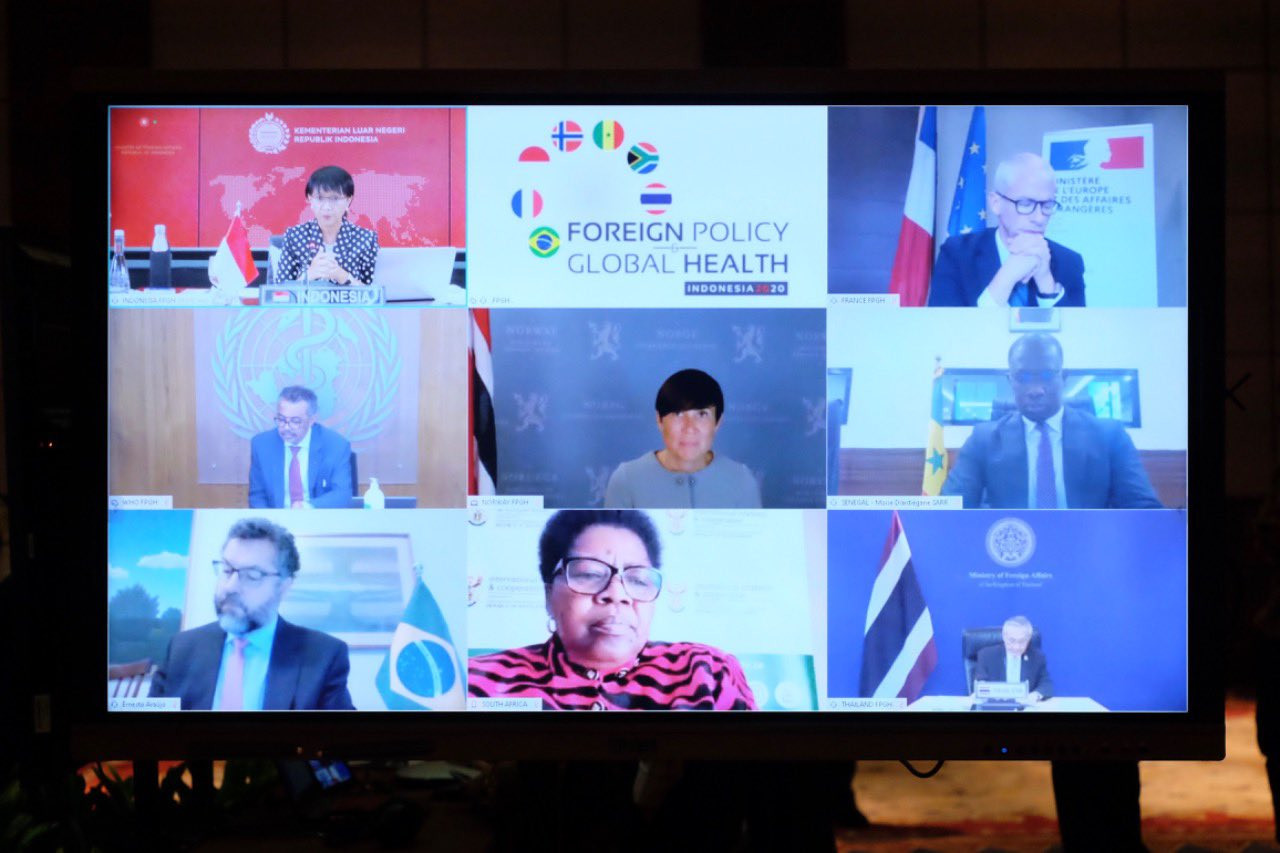Popular Reads
Top Results
Can't find what you're looking for?
View all search resultsPopular Reads
Top Results
Can't find what you're looking for?
View all search resultsRetno calls on FPGH to be ‘positive force' for equitable vaccine access
Indonesia, the 2020 chair of the Foreign Policy and Global Health (FPGH) forum, is pushing for equitable, affordable access to future COVID-19 vaccines as the threat of "vaccine nationalism" pervades ongoing vaccine development efforts.
Change text size
Gift Premium Articles
to Anyone
 Ministers of the seven-nation Foreign Policy & Global Health (FPGH) forum hold a virtual meeting on Sept. 3, 2020. World Health Organization Director-General Tedros Adhanom Ghebreyesus (center left frame) also attend the meeting on equitable access to COVID-19 vaccines for all countries. (Courtesy of/Foreign Ministry)
Ministers of the seven-nation Foreign Policy & Global Health (FPGH) forum hold a virtual meeting on Sept. 3, 2020. World Health Organization Director-General Tedros Adhanom Ghebreyesus (center left frame) also attend the meeting on equitable access to COVID-19 vaccines for all countries. (Courtesy of/Foreign Ministry)
I
ndonesia has called on fellow members of the seven-nation Foreign Policy and Global Health (FPGH) forum to push for equitable access to vaccines, especially at a time when poorer countries may lose out to their richer neighbors in securing access to any future COVID-19 vaccines.
“Meeting the domestic need for vaccines is a necessity, but we must not do so at the expense of others. [...] We must be a positive force for accessible and affordable vaccines for all,” Foreign Minister Retno LP Marsudi said in an official transcript of the forum's virtual meeting on Thursday.
Retno’s remarks come as a number of developed countries, including the United States, the United Kingdom, European Union members, Canada and Japan, have reserved an estimated 3.1 billion doses of experimental vaccines for themselves, before the clinical trials have even finished.
Other nations with more limited resources have opted to band together under multilateral initiatives to procure future vaccines or have secured bilateral agreements with vaccine-producing countries.
Read also: New reckoning for WHO vaccine plan as governments go it alone
Indonesia is no exception, as it has ordered 30 million doses of a potential COVID-19 vaccine for delivery by the yearend and up to 340 million doses for delivery next year in deals with China and the United Arab Emirates.
The World Health Organization (WHO) stated that the ideal goal was for each country to receive enough vaccines to inoculate 20 percent of its population, starting with health workers and the most vulnerable groups regardless of nationality.
Retno said that meeting domestic needs and securing access to affordable vaccines could go hand in hand, highlighting that a global effort was necessary to overcome and recover from the pandemic together.
“[The FPGH] must continue to stand behind multilateral initiatives such as the global allocation framework [of] the COVAX Facility to speed up vaccine development and ensure equitable and fair allocation,” she said.
“No one and no country should be left behind.”
The COVID-19 Vaccine Global Access (COVAX) is an initiative led by the Gavi vaccine alliance in coordination with the WHO and the Coalition for Epidemic Preparedness Innovations (CEPI) to purchase 2 billion doses of COVID-19 vaccines for equitable distribution to countries around the world in 2021. It has secured 300 million doses to date, reports AFP.
WHO Director-General Tedros Adhanom Ghebreyesus, who attended Thursday’s FPGH meeting, said that the COVAX effort had only managed to secure less than 10 percent of global needs.
He also underscored the danger of “vaccine nationalism” in compromising equitable access to future COVID-19 vaccines for all countries.
Read also: Efficacy and safety first: Experts urge government not to put vaccines on pedestal
"Once we have an effective COVID-19 vaccine, it’s vital that we also use it effectively. And the best way to do that is to ensure that some people in all countries receive it, rather than all people in some countries," Ghebreyesus tweeted.
The head of the global health authority lauded Indonesia’s efforts as the 2020 FPGH chair in advocating for "affordable health care for all".
The FPGH comprises Brazil, France, Indonesia, Norway, Senegal, South Africa and Thailand. Established in 2006, the forum has agreed to fully support global efforts to bring an end to the COVID-19 pandemic through global health and foreign policy harmonization.
In a related development, Retno also attended the G20 Foreign Ministers' Meeting on Thursday, during which representatives of the world's top economies sought international cooperation over easing travel restrictions and reopening borders.
Read also: G20 foreign ministers discuss easing travel restrictions
“This effort needs collective global leadership. Efforts to revive and reconnect our economic cooperation must be supported, [but] without sacrificing strict health protocols,” the minister said in her remarks.
During the meeting, the ministers discussed the "importance of coordinating precautionary measures" across borders to protect lives and livelihoods, the G20 said in a joint statement following a virtual meeting hosted by Saudi Arabia.









